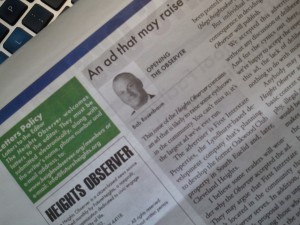 It’s the little things that make writers, editors and columnists crazy – like when a small change in punctuation or wording makes a big change in the meaning of what the writer is trying to say.
It’s the little things that make writers, editors and columnists crazy – like when a small change in punctuation or wording makes a big change in the meaning of what the writer is trying to say.
In the May edition of my monthly Heights Observer column , I wrote about our policy for accepting advertisements.
The context of this is a large ad that was placed by First Interstate Properties, the development company that plans to build a retail plaza on the former Oakwood Club golf course.
The point of this blog post is not to rehash what’s in the column, but rather to acknowledge a fine point that was changed between the time I wrote the column and the when the column appeared in print.
In my original version, I explained why I supposed a number of people would question our allowing the First Interstate ad to run. I wrote:
I believe some readers will wonder why the Observer accepted the ad, since First Interstate isn’t located in the community that the Observer serves, and because First Interstate’s proposal is so unpopular among many of the individuals who have had the most to say on the subject.
The last part of that sentence was written carefully to highlight the apparent fact that, among the public opinions expressed about the development, most have been negative. But it also acknowledges that I can’t assume those most-vocal opinions necessarily represent overall community sentiment. That’s something I couldn’t possibly know.
Between the time I completed the column and the time it got printed, one of our volunteer editors made a couple changes.
Here’s how it was edited for print:
I believe some readers will wonder why the Observer accepted the ad. They may argue that First Interstate isn’t located in the community that the Observer serves. In addition, First Interstate’s proposal is so unpopular, especially among those who have had the most to say on the subject.
The change was small, and the paragraph may actually flow more smoothly, which I’m sure was the editor’s intent. But the change in meaning was substantial and unfortunate. The sentence now says exactly what it wasn’t supposed to say: It states that most people are against the development – something I don’t know to be factually correct and, therefore, that I shouldn’t assert.
We’ve since changed the way the column reads online to the way it was originally written. And the editor who made the change has been made aware of it.
But in the 10,000 issues of the paper that have been printed, I’m now on the record as having said the opposite of what I intended.
Issues like this pop up all the time in publishing – among the most established media as well as in non-profit volunteer outfits like the Observer.
Nobody wants to see these things happen. But people aren’t perfect; nor are the processes by which information gets published. So the best one can do in such instances is to explain and offer a correction. Which, I believe, I have now done.



Leave a Reply